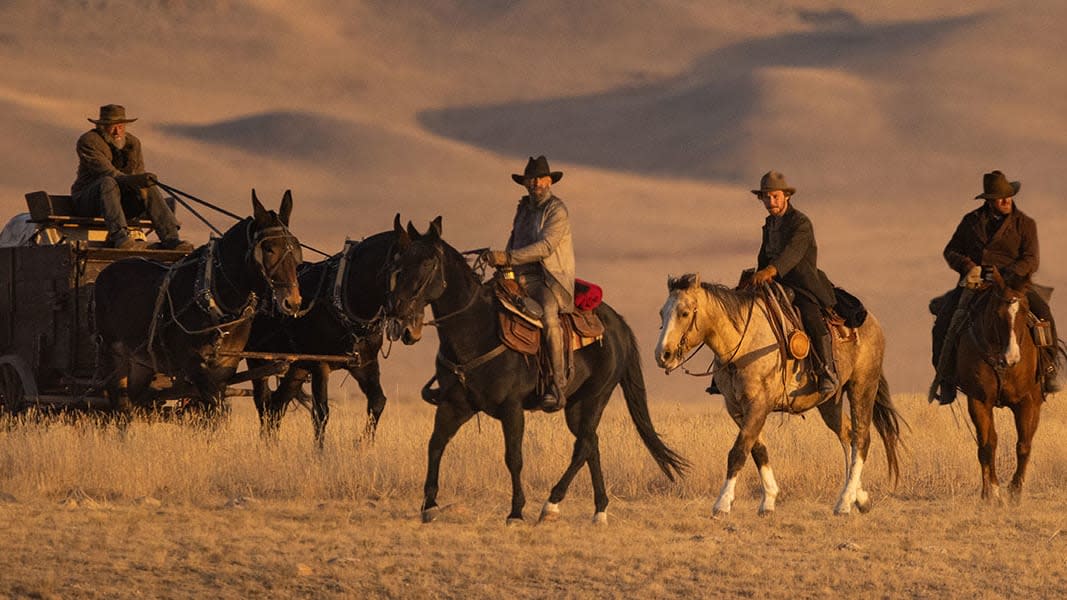Nicolas Cage Looks Great on the Horse That Tried to Kill Him in ‘Butcher’s Crossing’

Nicolas Cage has made a living in the film industry within the past couple of decades as a "do anything" type of guy.
A cosmic sci-fi horror about an indescribable color? He'll do that. A twisted comedy about parents who desperately want to kill their kids? He'll do that. A psychedelic fantasy action thriller about a guy avenging his murdered girlfriend? He'll do that. Various indie crime movies, or even a movie where he gets to play multiple versions of himself? He'll do it all!
In the past few years, Cage has been engineering something of a comeback, attempting to win back some of the awards-y prestige he had in the '90s and early 2000s and pretty steadily succeeding at it. His turn as a former celebrated chef-turned-woodland-misanthrope, who goes on a doomed journey to find his stolen truffle pig in Pig, is solid evidence for the Cage comeback. He's the type of guy who is great even in movies that are bland-to-bad otherwise—as is the case in Gabe Polsky's understated western Butcher's Crossing, premiering at this year's Toronto International Film Festival.
Polsky's film, based on novelist John Williams' revisionist western novel, opens on the town of Butcher's Crossing, a nowheresville Kansas community that sprung up, as so many did, thanks to the buffalo trade. It was a boom that lasted about 20 years, during which hunters nearly drove the American bison to extinction.
The 10 Craziest Nicolas Cage Stories Ever, From Being Stalked by a Mime to Shrooming With His Cat
The year is 1874, the twilight of the hide trade, and Will Andrews (Fred Hechinger) arrives in town having dropped out of Harvard, opting to pursue adventure on the frontier instead. While coasting around looking for anyone to pay him some attention, he falls in with veteran buffalo hunter Miller (Cage), an obsessive who claims to know of a secret location where the animals still gather in herds reminiscent of the numbers that used to carpet the grasslands.
When Andrews puts up a conspicuous amount of cash to finance the expedition Miller wants to run into the Colorado Rockies, they gather a small team and set out with a wagon and a pair of mules to carry back what Miller promises will be nothing short of a windfall of hides. But the trip swiftly becomes much more than any of them expect, as Miller's obsession gets the better of him. He drives them all further into the steppe than is safe to go, as Miller's trigger finger brings down hundreds of bison every day.
The first time many of us heard about Butcher's Crossing was likely during The Hollywood Reporter's actors roundtable from earlier this year, where Cage and fellow roundtable member Jonathan Majors swapped stories of working with their horses on set. Majors, who had just completed Netflix's western The Harder They Fall, lovingly described the connection he felt with his horse co-star by the time they had wrapped filming. Cage, on the other hand, had a different experience: "My horse on Butcher's Crossing, named Rain Man, wanted to kill me."
"I was in Blackfoot Country," he explained. "Rain Man kept trying to knock me off and would try to run my head into roofs, and then I'd get off and try to be nice to him, and he would head-butt me. It was not fun. I've always had good experiences with animals. I always had great experiences with horses, but Rain Man wanted to kill me."
Rain Main is indeed an absolutely enormous horse, muscular and black, a perfect complement to Cage's steely beardy persona in Butcher's Crossing—one of a few things elevating the movie from "fine" to "pretty good." Polsky's attention to detail and appreciation for sweeping vistas carry most of the movie, which is unfortunately saddled with an unusually thin script without much more to say about things than "bison hunting was bad."
(Though the movie is good at illustrating exactly why the hunt was so devastating: Bison don't run if they can't sense the threat, milling around in place as the herd around them is dispatched one by one.)
Nicolas Cage Stuns SXSW Playing Himself in ‘The Unbearable Weight of Massive Talent’
Hechinger, for better or worse, is great at looking confused, panicked, and completely out of his depth—great in The White Lotus, but treading water here. Rachel Keller, the saving grace of FX's Legion, gets a mostly thankless role as a prostitute whose screen time is mostly in flashbacks. Sound of Metal's Paul Raci is fantastic as the town's loud, gross buffalo hide accountant, who spends his two scenes sneering and spitting at Cage and his comrades.
There is a flavor of Apocalypse Now's Willard and Kurtz in the increasingly strained relationship between Andrews and Miller, but the film is more along the lines of The Old Man and the Sea, if Santiago had happened to have a couple of comrades on his boat who were just as doomed as he was.
There is no sense of urgency to the proceedings, nothing to compel any of the characters beyond the slow march of the seasons and the trudge of the bison they're following. By the end we are left feeling as Andrews does, a tourist dipping a toe in while things hold his interest, and quick to depart as soon as the experiment runs its course.
Get the Daily Beast's biggest scoops and scandals delivered right to your inbox. Sign up now.
Stay informed and gain unlimited access to the Daily Beast's unmatched reporting. Subscribe now.

